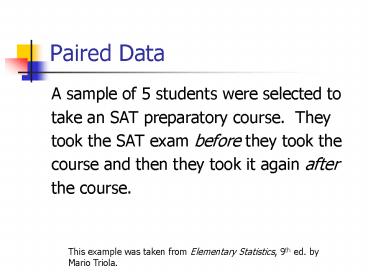Paired Data PowerPoint PPT Presentation
1 / 12
Title: Paired Data
1
Paired Data
- A sample of 5 students were selected to
- take an SAT preparatory course. They
- took the SAT exam before they took the
- course and then they took it again after
- the course.
This example was taken from Elementary
Statistics, 9th ed. by Mario Triola.
2
Data
1)determine if the preparatory course was
effective in increasing the mean SAT score with
5 level of confidence 2) Construct the 95
confidence interval for the difference between
mean score before and mean score after the
preparatory
3
- 1)Let ?B denote the mean TSE score before the
course, - ?A the mean TSE score after the course.
a
4
1b. All observations in this group are
independent of each other. This is ok.
These are the before course measurements.
These are the after course measurements.
We also need the measurements in each group to
come from a normal distn. This is probably ok.
1a. All observations in this group are
independent of each other. This is ok.
2. An observation in one group must be
independent of an observation in the opposing
group. Now we have a problem.
5
This is where the problem lies. The score that
someone makes before the prep course is
correlated with the one they make after the
course.
These 2 are not a problem because one students
SAT score doesnt affect someone elses.
6
- Lets say d ? Diff After Before.
7
- Let ?d?A -?B
- To determine if the course is effective, we
- can test
- This involves a one sample t-test.
P-valuegt0.05,retain H0,i.e.we dont have
significant Evidence to say the preparatory
course was effective in increasing the mean SAT
score with 5 level of confidence
8
- 2) is equivalent to find 90 CI for ?d
- Which can be done the same as the one sample
case. - (-3.77,35.77)
9
Inferences for ?1-?2 based on matched samples
- Application matched samples
- A (1- a)100 CI for ?1-?2 based on the matched
samples is - Matched pairs t-test
- The standardized TS is
10
Exercise 9.5
- A group of 24 low-ability students of the same
age were tested for reading skills and then
paired according to ability. One member of each
pair was assigned to an experimental reading
group and the other to a control group. The
experimental group was taught using new method of
reading instruction, and the control group was
taught using the standard method that normally is
used to teach low-ability students. After the
period of instruction, all students were given a
reading achievement test with these results - Pair 1 2 3 4 5
6 7 8 9 10 11 12 - Control 78 60 64 66 51 68
61 59 71 88 50 57 - Experimental 82 65 63 71 48 74
61 65 73 92 57 66 - Perform a test of hypothesis to determine whether
the experimental group performed significantly
better than the control group.
11
- P-valueP(tgt3.604)lt0.05
- Reject H0
12
End

